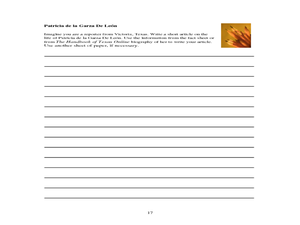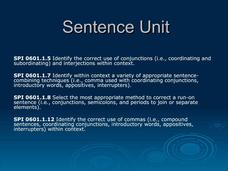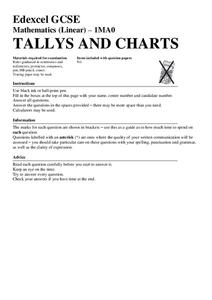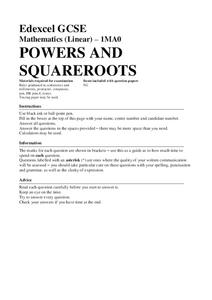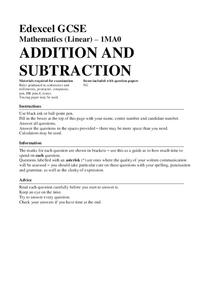Curated OER
Scary Short Story Writing Lesson
There's nothing like the prospect of writing a scary story to get your middle schoolers' writing juices flowing! In the lesson presented here, pupils listen to scary short stories read to them by the teacher. Then, a discussion ensues...
Mathed Up!
Compound Interest and Depreciation
Discover how to find the value of an interest-bearing account. Individuals watch a video to learn how to use exponential functions to model compound interest. After the video, they complete a learning exercise of problems on compound...
Curated OER
Focus on Harmony
Harmony is the focus of this band lesson plan. Upper graders play the Star Spangled Banner, while focusing on harmony, chords, and musical voice. This lesson plan includes several suggested cross-curricular activities.
Curated OER
Reading Text with Appropriate Phrasing and Proper Expression
Practice reading with expression and appropriate phrasing with a scaffolded instructional activity. There is a detailed script here for you, but you could easily use it simply as an outline. Begin by modeling effective reading by...
Scholastic
Transitional Guided Reading
Use a fill-in-the-blank lesson plan template to enhance your guided reading lesson plans with details surrounding decoding strategies, fluency and phrasing, vocabulary strategies, comprehension, and more!
California Department of Education
An Online Tool I Can Use
Tools for school—and beyond! Introduce your sixth graders to online tools to plan their academic and professional futures. The fifth and final lesson in a series of career and college readiness activities focuses on a scavenger hunt to...
Curated OER
Double Jeopardy-Homophones
Second graders identify homophones as words that sound alike but have different meanings. They, given a pair of homophones, are to explain the meanings of the words using gestures, role playing, or drawing a picture with their partner.
BBC
Lug and the Giant Stork - Capital Letters
Capital letters are the star of the show in a wonderful language arts lesson. After a teacher-led demonstration and discussion on capital letters, groups of pupils get together and work on the computer to fix the flashing letters that...
Curated OER
Las Tejanas
Fourth graders recognize that the Tejanas were Texas women of Spanish-Mexican origin who contributed to the history of Texas. Students read and research the Tejanas women, complete an essay about a day in the life of a Tejanas woman ,and...
Curated OER
Revising/Editing (3-5): Editing Marks. Part II and Literary Tools. Part II
Familiarize your class with commonly used editing marks. They apply the use of editing marks to a letter and examine different types of literary tools before making a note card resource for the tools. They add their own examples for each...
Indiana University
World Literature: "One Evening in the Rainy Season" Shi Zhecun
Did you know that modern Chinese literature “grew from the psychoanalytical theory of Sigmund Freud”? Designed for a world literature class, seniors are introduced to “One Evening in the Rainy Season,” Shi Zhecun’s stream of...
Book Units Teacher
Sentence Unit
Imagine using history to teach grammar. This 178-slide PowerPoint presents an amazing collection of images and historical information about the settlement of Tennessee and about famous residents like Daniel Boone. Viewers are tasked with...
Curated OER
Review of a Novel Project
This review of a novel project is a great way to ensure accountability for independent reading. The assignment sheet, templates, samples, and rubrics are all part of the packet materials.
Mathed Up!
Tallys and Charts
After watching a brief instructional video, young mathematicians are put to the test. By completing and reading frequency tables, tally charts, and bar graphs, individuals show their understanding of how to interpret data.
Mathed Up!
Place Value
Prompt class members to find the value of various digits, and to write numbers in standard form and written form. Pupils also round multi-digit numbers to the nearest hundred and thousand.
Mathed Up!
Ordering Numbers
Young mathematicians order numbers from least to greatest. Number types include whole numbers, decimals, and negative numbers.
Mathed Up!
Reading Scales
After watching a video on how to read different types of scales, young mathematicians complete eight problems involving scales. From thermometers to number lines to rulers and clock, class members identify various numbers on scales.
Mathed Up!
Negative Numbers
Individuals read tables with temperatures and times in order to distinguish the town with the lowest temperature or most extreme temperature difference. Each of the eight questions has three sub-questions that use the same charts.
Mathed Up!
Money Problems
Mo' money, mo' problems! But don't worry, here is an assessment that proves to young mathematicians that they can solve actual money problems. The resource includes 11 money problems involving addition, subtraction, multiplication, and...
Mathed Up!
Fractions of an Amount
After viewing a video on fractional amounts, young mathematicians put their new knowledge to the test. Throughout the assessment, class members find the fractional amount for prices, times, and populations. There are a few percent and...
Mathed Up!
Powers and Square Roots
Square root and exponential powers are the focus of the assessment worksheets included in a math resource. Young mathematicians answer 10 questions, each with subset questions, involving solving a variety of exponential equations and...
Mathed Up!
Addition and Subtraction
After watching a brief video on addition and subtraction, young mathematicians are put to the test. Including 12 problems, individuals solve word problems to find the least number, total amount, and difference of numbers.
Mathed Up!
Shading Fractions of Rectangles
Learners find the midpoint between two numbers, shade fractional amounts of rectangles as well as decimal amounts of rectangles, and explain their mathematical reasoning in words. The assessment is a great way to check for understanding...
Mathed Up!
Congruent Shapes
Are congruent shapes compatible? Congruent shapes are identical to one another, and throughout the assessment, young mathematicians identify given shapes as congruent.










